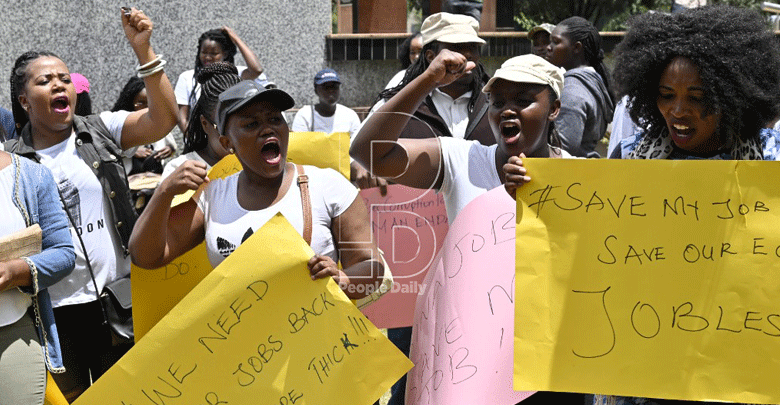Survey: Workers concerned about reduced income

Steve Umidha @UmidhaSteve
Almost two in five working Kenyans are concerned about their income, a new research on economic impact of the Coronavirus pandemic shows.
The survey, conducted by research firm GeoPoll found that in Kenya, recent resurgence of the pandemic and renewal of government restrictions appeared to have had a severe economic impact, with 79 per cent of respondents in the country reporting a decrease in income.
Young people in Kenya appear to be particularly affected, with 66 per cent of respondents ages between 15 and 25 saying their income has decreased a lot. Only 10 per cent of respondents across countries said their income has increased even a bit.
The Economic Impact of Covid-19 in sub-Saharan Africa report for May 2021 was released last week.
The study was run in six countries: Côte D’Ivoire, the Democratic Republic of Congo, Kenya, Mozambique, Nigeria, and South Africa.
Current spending
It further shows that spending on food and other necessities has fluctuated significantly since the start of 2021.
When asked to compare their current spending on food and other necessities to three months ago, most respondents choose the extremes, saying it either decreased a lot (27%) or increased a lot (24%). Only 12 per cent of respondents said it has not changed.
According to the study, the overwhelming reason why respondents across countries said their spending on food and other necessities has decreased is that they have less money, about 76 per cent.
For respondents that stated their spending on food and other necessities has increased, 85 per cent claimed the increase is because prices have gone up. In Nigeria, that number rises to 94 per cent.
With 64 per cent of respondents saying their income has decreased since January 2021, it is understandable that 60 per cent of respondents say their spending on non-essential items has also decreased.
In Kenya, where 79 per cent of respondents experienced a decrease in income, 51 per cent said that their spending on non-essential items had decreased a lot.
It was likely a matter of prioritising essentials such as food over non-essentials such as fashion items.
The global pandemic has seen many industries suffer the brunt of a forced change in lifestyle as the government imposed measures to cut the spread of the disease.
As a result, many businesses closed down or reduced capacities, leading to income and job losses for many working Kenyans, while others were forced to take pay cuts.
The World Bank, in its biannual economic analysis for sub-Saharan Africa in March 2021, for instance, projects the region to see a moderate economic growth this year, rebounding from the Covid-19 induced recession of 2020.
However, the resurgence of the pandemic and a looming fourth wave is dampening those projections, and many are at risk of suffering further setbacks to their personal finances and living standards, according Mary Munyiri – the Chief executive of micro finance company, ECLOF Kenya
“What you are likely to see is a gentle growth of the economy and that will depend if there’s a fourth wave.
I also do not think companies will be looking to rehire new staff in the next months, but I can foresee collaborations to create synergies among companies,” she said.
Those sentiments were shared by Peter Biwott, a development economist who believes that the economic growth will be slower than the figures being quoted by various agencies and its rebound will depend on effectiveness in the vaccination process by the government.
“The pandemic has had an effect on job creation. It’s no longer a huge concern because the economy is now in a recovery path, especially after the vaccination process began.
If the vaccination process goes on as planned or even gets accelerated, confidence will be built among economic actors and the concern will be fully addressed in the medium term by end of 2022,” he said.
Third quarter
Unemployment rate in Kenya decreased to 7.20 per cent in the third quarter of 2020 from 10.40 per cent in the second quarter of the same year in a period that saw thousands and millions of working Kenyans lose their jobs due to the pandemic.
The joblessness rate measures the number of people actively looking for a job as a percentage of the labour force which is ordinarily reliant on the economic performance.
Kenya’s economy is expected to grow by 7 per cent in 2021 on account of the resumption of international trade, strategic investments in the country’s development priority areas.
The gross domestic product (GDP) is forecast to almost double by 2024, and unemployment, although still above 10 percent, is expected to remain on the decline.















